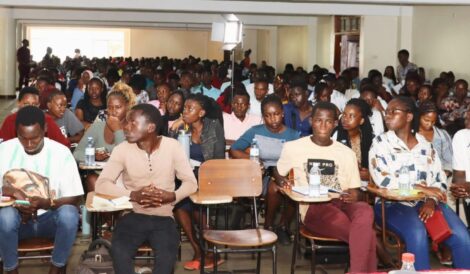Africa Must Own Its Digital Future, Warns Minister Musenero at AI in Health Conference
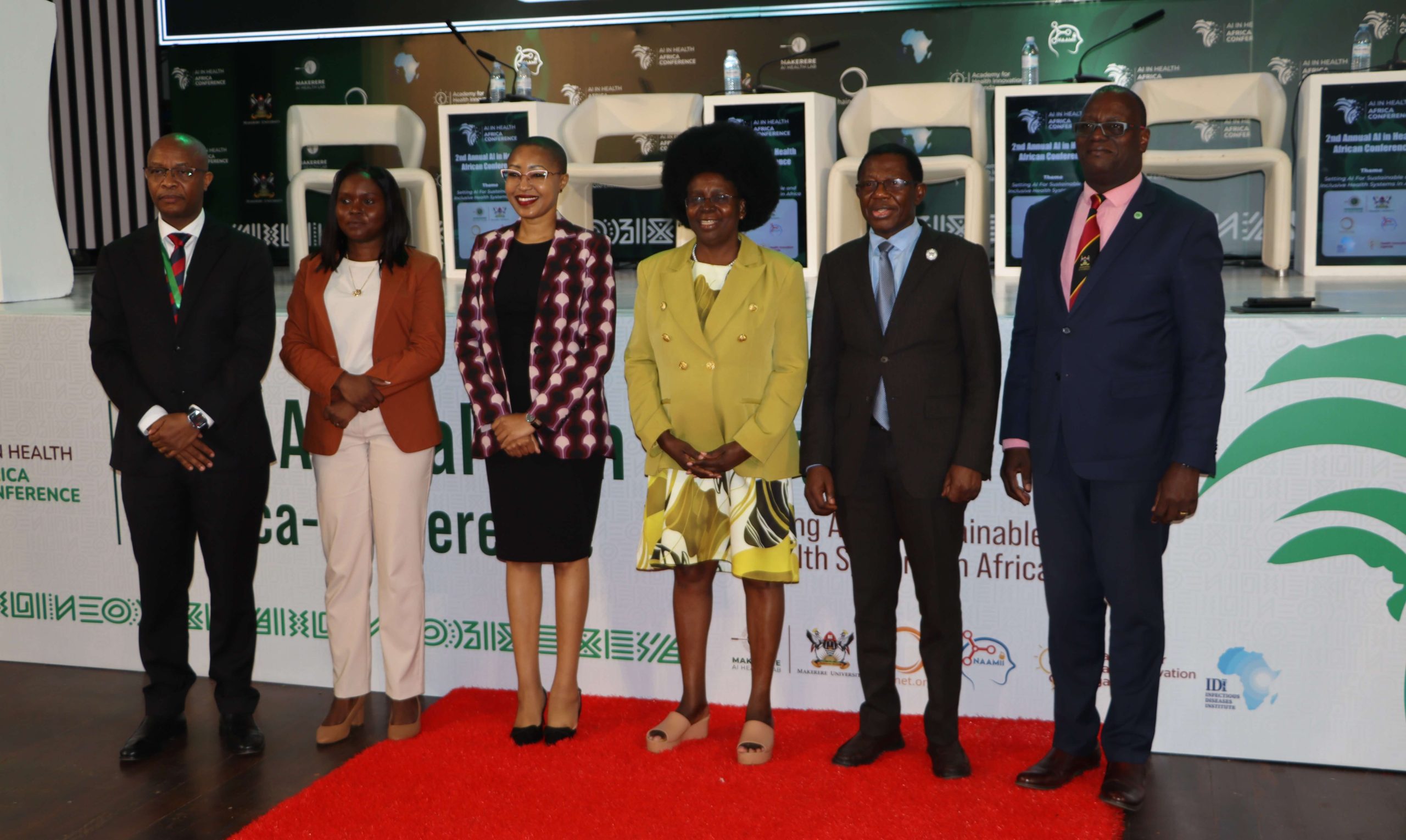
Minister Monicah Musenero (4th) in a photo moment with the first panel speakers after the opening session in a p
By Jane Anyango
6th November 2025
Makerere University
Africa must move beyond being mere consumers of technology and take active ownership of its digital and artificial intelligence (AI) future, warned the Guest of Honour, Hon. Minister Dr. Monicah Musenero, during the opening of the second annual Artificial Intelligence in Health Africa (AIHA) Conference at Makerere University.
Dr. Musenero was speaking as chief guest during the 2nd AI in Health Africa Conference held on 6th – 7th November 2025, where experts, policymakers, researchers, and healthcare innovators explored AI-driven solutions tailored to Africa’s unique healthcare landscape.
Building on the success of the inaugural event, this year’s conference under the theme, “ Setting AI for Sustainable and Inclusive Health Systems in Africa,” highlight South-to-South collaboration, knowledge exchange, and the localization of AI in African healthcare systems.
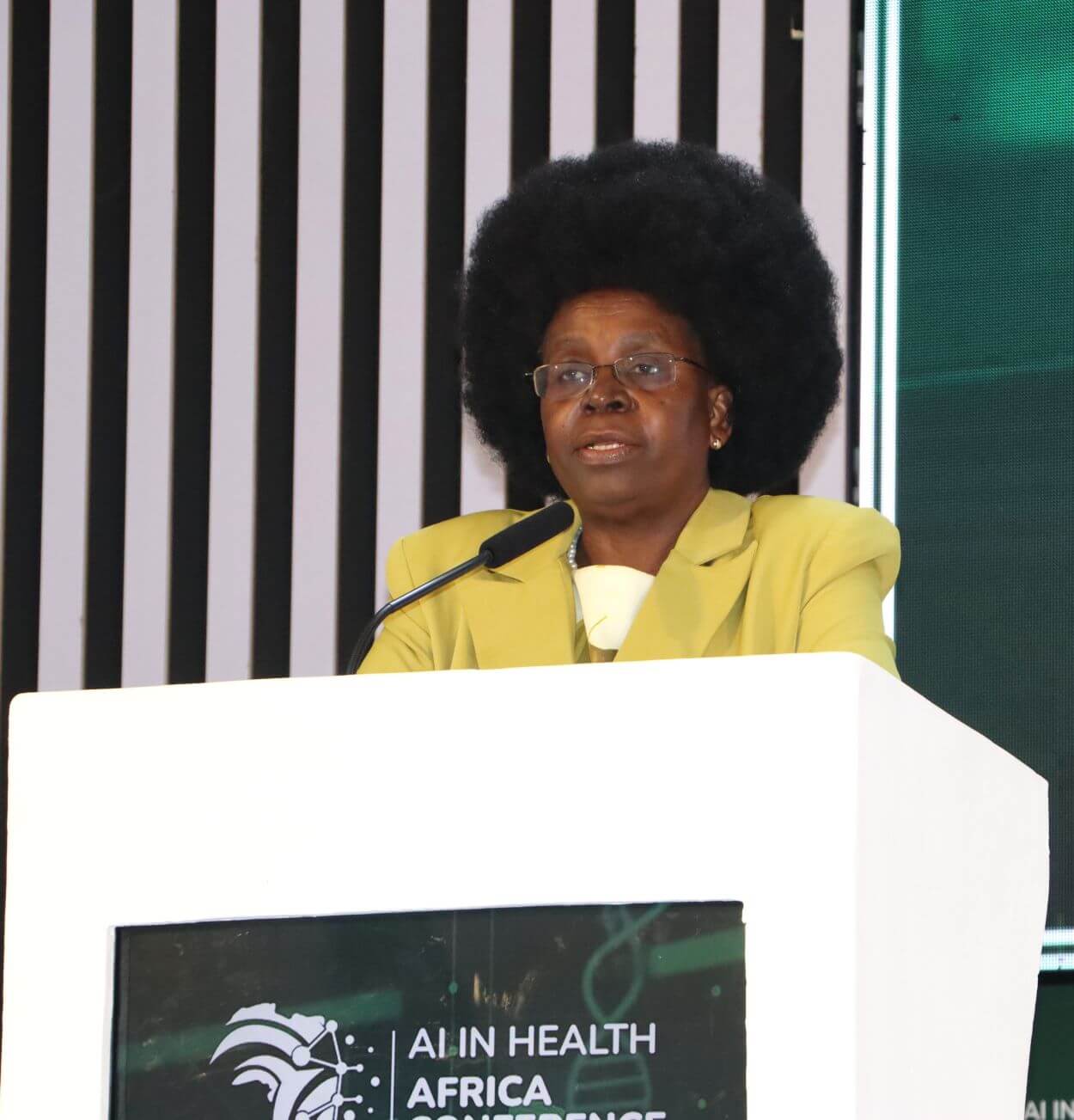
Dr. Monicah Musenero delivering a keynote address
Key discussions focused on integrating AI with indigenous knowledge systems, addressing linguistic and cultural diversity, and ensuring AI enhances existing healthcare tools rather than creating siloed solutions. The role of generative AI in healthcare innovation and sustainable business models also took center stage.
Dr. Musenero emphasized that AI is not just a tool, but an extension of human skills. “It is a very skilled human being who delegates a component of their skills into an intelligence system. That system will be as good as the one who skilled it; it cannot be better,” she noted.
Highlighting Africa’s historical approach to technological revolutions, Dr. Musenero traced the continent’s journey from initial non-recognition and skepticism, to consumption, and now a critical opportunity to contribute to technological creation. She cautioned that failure to actively participate in shaping AI and digital platforms risks economic disadvantage and unemployment.
Through a vivid example, Dr. Musenero illustrated the implications of digital migration on local economies. She told the story of a hypothetical data scientist, Timothy, whose job application process shifts from traditional manual methods to digital systems. While the transition is convenient for Timothy, the local stationery and transport businesses lose revenue, she explained. “If we are not creators of AI technology, if we simply consume or build superficial models, we risk migrating value out of our economies,” she warned.
Dr. Musenero called for sustainable and locally-owned AI systems that drive not only convenience but also economic growth. She urged African scientists, researchers, and policymakers to move from passive participation to active ownership, creating platforms and AI models that retain value within the continent.
In closing, she challenged participants to rethink Africa’s role in the global digital landscape: “The future of Africa is in our hands now. We can no longer reside on the shallow end of science. We must be willing to enter the forest and build our own digital economy.”
Uganda Advances AI Governance and Digital Transformation, Says Ministry Representative
Uganda is accelerating its digital transformation and artificial intelligence (AI) agenda, emphasizing ethical, locally relevant, and inclusive innovation, Dr. Ambrose Ruyoka, Commissioner for Research and Development in ICT and Emerging Technologies, announced at the second Artificial Intelligence in Health Africa (AIHA) Conference at Makerere University.
Speaking on behalf of the Permanent Secretary of the Ministry of ICT and National Guidance, Dr. Amina Zawedde, Dr. Ruyoka highlighted that this year’s conference theme, “Scaling AI for Sustainable and Inclusive Health Systems in Africa,” aligns with Uganda’s national digital transformation roadmap. The framework seeks accelerated, inclusive growth through five key pillars: infrastructure, digital services, digital innovation, cybersecurity, and data protection.
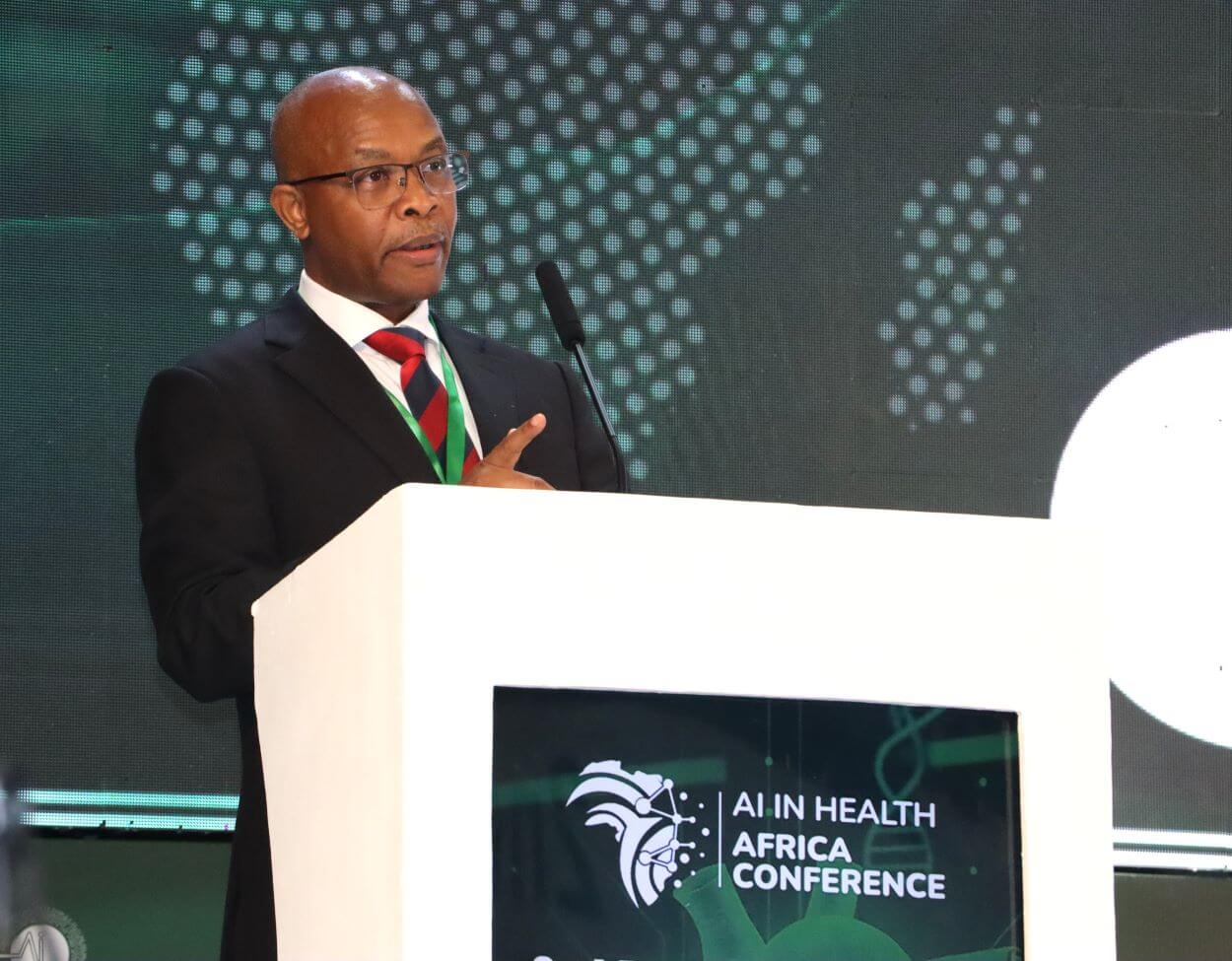
Commissioner Ambrose Ruyoka representing the Permanent Secretary
Dr. Ruyoka urged participants to design context-driven innovations that are scalable, globally relevant, and able to empower health workers without displacing them. Using past initiatives such as Uganda’s 2007 telemedicine and e-learning projects, he illustrated the importance of pairing AI adoption with capacity building for local professionals.
The Commissioner also outlined government efforts to formalize AI governance, including the development of a national emerging technologies framework, integration of AI and data governance, and the establishment of a national AI task force, set to be unveiled this month. Uganda is also conducting a regulatory impact assessment to guide whether AI should be governed under a flexible or restrictive framework, in line with African Union and UNESCO ethical recommendations.
“Data governance is central to this effort,” Dr. Ruyoka emphasized, noting ongoing work to expand digital infrastructure, enhance rural connectivity, and nurture innovation through national hubs. “The digitally empowered generation stands at the heart of this transformation, and our young innovators, students, and professionals here today should know AI is not for the future—it is now.”
He concluded by calling for collaboration among government, academia, industry, and development partners, stressing that Africa’s progress depends on united purpose and meaningful partnerships. “Let the world look to Africa, not as a continent of problems, but as a continent of solutions,” he said.
Makerere Vows to Harness AI to Transform Health Systems, Emphasizes Homegrown Solutions
Makerere University reaffirmed its commitment to leveraging artificial intelligence (AI) to address Africa’s pressing health challenges, with a focus on locally-driven solutions.
Representing Vice Chancellor Prof. Barnabas Nawangwe, Prof. Buyinza welcomed international participants and highlighted the university’s pivotal role in translating research into practical health interventions. “This conference is not about technology—it’s about people, especially the vulnerable communities that bear the greatest burden of disease,” he said, noting the rising threats from infectious and non-communicable diseases.
Prof. Buyinza emphasized AI’s potential as a healthcare equalizer, enhancing disease surveillance, precision diagnosis, and personalized treatment. He cautioned, however, that technology alone cannot transform health systems without investment in infrastructure and ethical frameworks. “We need to invest meaningfully in infrastructure and ensure the ethical use of AI before scaling innovations,” he noted.
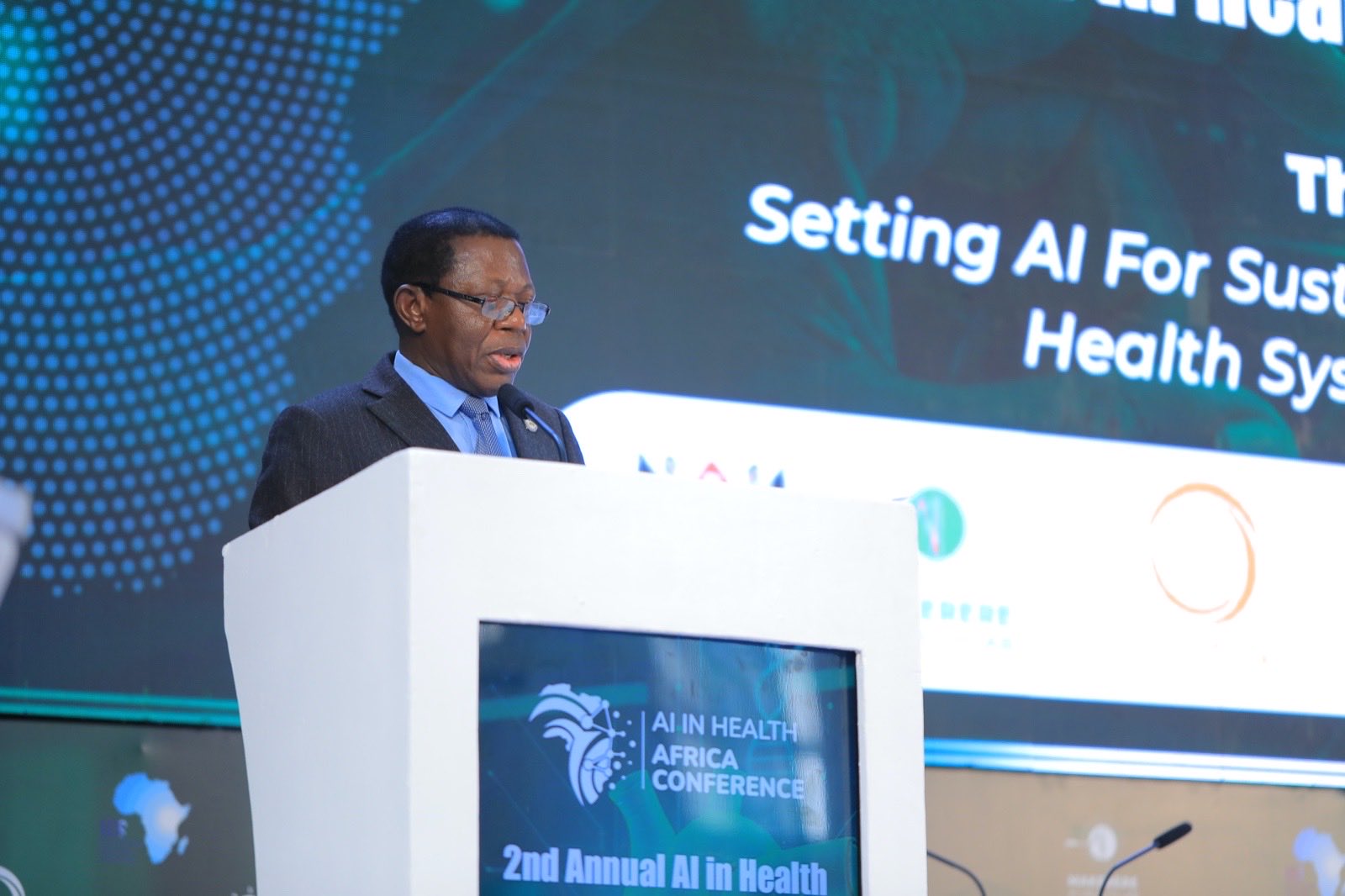
Prof. Mukadasi Buyinza representing the VC
Highlighting Uganda’s digital landscape, Prof. Buyinza pointed out the disparity between widespread smartphone use and gaps in access to basic services, such as electricity, underscoring the need for homegrown AI solutions that reflect local realities. He stressed the importance of building national expertise to develop algorithms and technologies tailored to Uganda’s health challenges, rather than relying solely on imported models.
Makerere’s partnerships with the Infectious Diseases Institute (IDI), the AI Core, Sunbird AI, and the African Population and Research Institute were cited as key enablers of research translation into health solutions. “Progress in AI and health will not come from competition; it will come from cooperation. Through these collaborations, we can deliver tangible improvements to our people’s lives,” he said.
Prof. Buyinza concluded by reaffirming Makerere’s commitment to bioinformatics and data science, emphasizing that AI should empower, not replace, healthcare professionals. The conference, running over two days, convenes policymakers, researchers, and innovators to explore AI’s role in strengthening health systems across Africa.
African Governments Urged to Invest in AI Infrastructure to Improve Health Diagnostics
Government must invest deliberately in artificial intelligence (AI) infrastructure and research if it is to play a meaningful role in transforming Uganda’s healthcare system, Prof. Tonny Oyana, Principal of the College of Computing and Information Sciences (CoCIS), warned.
Prof. Oyana highlighted AI’s potential to improve disease diagnosis and reduce misdiagnosis, particularly in public hospitals where patients often rely on self-reported symptoms. “AI holds the promise of providing low-cost diagnostic approaches that can complement laboratory services and expand access for the majority of Ugandans who cannot afford expensive private testing,” he said.
He also noted the growing global investment in advanced AI chips and data processing capabilities, underscoring Africa’s lag in these critical areas. “Most of the giant research money is concentrated in the US, UK, and parts of Asia. Africa, including Uganda, is being left behind. If we want to play a key role, we must be intentional and invest in AI discovery and infrastructure,” Prof. Oyana said.
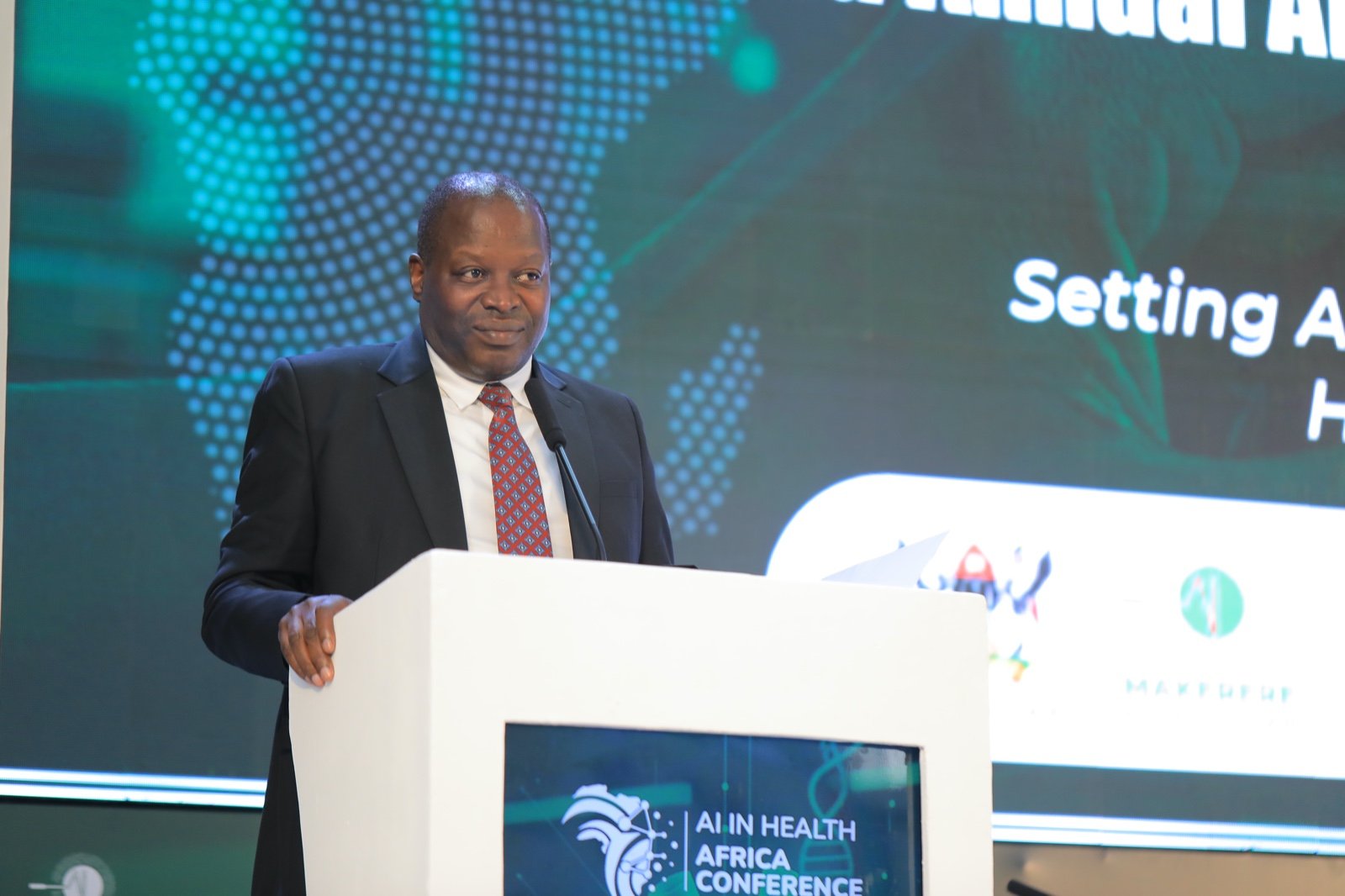
Citing examples from South Africa and North African countries, he emphasized the need for more data centers and research capacity in Uganda. While acknowledging local initiatives such as NITA and telecom operators’ facilities, he said they remain insufficient to support large-scale AI development.
Prof. Oyana called on policymakers to match rhetoric with action, encouraging strategic investments that would position Makerere and Uganda as leaders in AI-driven healthcare. He highlighted the university’s collaboration with health institutions and praised private facilities like Lancet and Ruby Clinic for their diagnostic capabilities but stressed that similar technologies should be accessible in public hospitals like Mulago.
“Policy makers, put your money where your mouth is. We have talented brains here, but without the infrastructure and support, their potential remains underutilized,” he concluded.
The two-day AIHA conference brings together experts, innovators, and policymakers to explore AI’s role in strengthening health systems across Africa.
Dr. Kambugu Calls for Africa-Centric AI in Health to Bridge Continent’s Health Gaps
Africa must seize the transformative power of artificial intelligence (AI) to build health systems that are tailored to the continent’s unique needs, Dr. Andrew Kambugu, Co-Chair of the Artificial Intelligence in Health Africa (AIHA) Conference, urged.
Dr. Kambugu emphasized that while global companies like Nvidia, Microsoft, Apple, Google, and Amazon are harnessing AI to generate billions in value, Africa continues to face stark disparities in healthcare access and quality.
“This is a crossroads for our continent,” Dr. Kambugu said. “We can either be left behind, as has happened in the past, or we can take AI and fashion it to address our own needs. We must make AI Africa-centric—ethical, inclusive, and designed by Africans for Africans.”
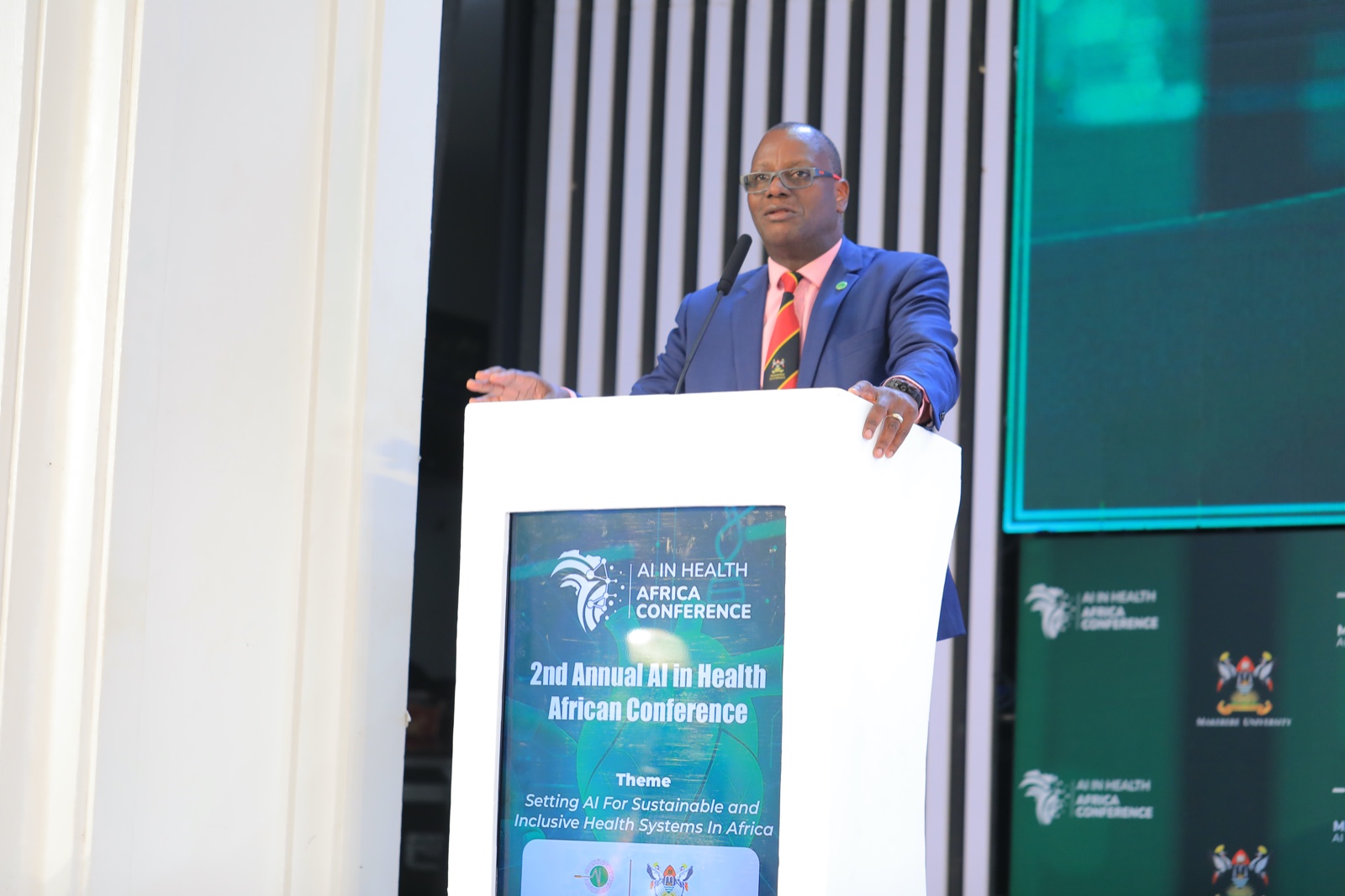
Dr. Kambugu delivering his remarks
Dr. Kambugu highlighted AI’s potential to revolutionize healthcare through innovations such as automated microscopy and protein structure prediction tools like AlphaFold. He lauded recent efforts in Africa to train young scientists on these technologies, noting that Makerere’s own partners and the ACE program have been instrumental in building local capacity.
The IDI co-chair stressed the importance of inclusivity in AI-driven initiatives, spotlighting a data science program for women called SHEDS, developed in collaboration with the University of California, San Francisco.
“AI offers unprecedented tools to improve diagnostics, disease surveillance, and healthcare delivery,” he said. “But to truly transform health systems, we must center African expertise and ensure ethical, context-driven solutions.”
Dr. Nakasi Urges Africa to Leapfrog in Healthcare Through Contextualized AI Innovations
Africa must harness artificial intelligence (AI) to transform healthcare systems across the continent, Dr. Rose Nakasi, Principal Investigator of the Makerere AI Health Lab and Ocular Project, said.
Speaking before a gathering of international researchers, policymakers, and development partners, Dr. Nakasi emphasized that AI is no longer a distant concept but a practical tool capable of improving diagnostics, disease surveillance, and patient outcomes. She highlighted the importance of collaborative efforts to ensure AI is tailored to African contexts rather than imported wholesale from other regions.
“This year’s participation reflects our growing commitment to not only engage with AI but to lead in producing innovations that are by Africans and for Africans,” Dr. Nakasi said. “We must leverage our knowledge, spirit, and partnerships to transform healthcare systems and improve patient care across the continent.”
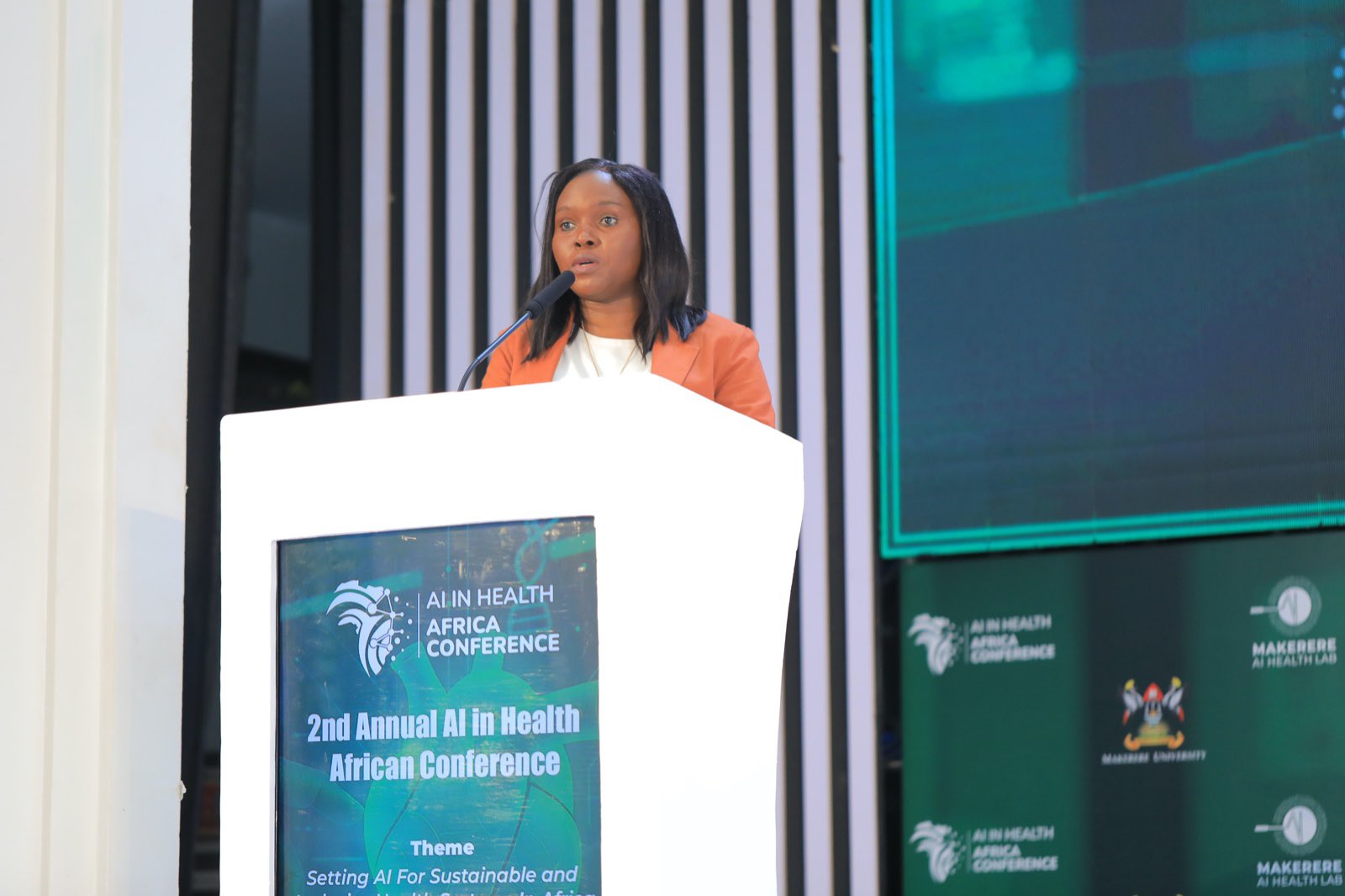
Dr. Rose Nakasi speaking during the conference
Dr. Nakasi pointed to telehealth platforms and AI-driven diagnostic tools as examples of how technology can address the challenges posed by limited healthcare infrastructure, particularly in remote areas. She cited the Uganda Cancer Institute as a case where AI could help expand access to specialized care beyond centralized urban centers.
She also acknowledged the contributions of international and regional partners, including the Infectious Disease Institute, the African Population Health Research Center, Google, NIH, Science for Africa Foundation, Lacuna, and Grand Challenges Canada, which support Makerere University in developing impactful, scalable AI solutions.
The conference, themed “Scaling AI for Sustainable and Inclusive Healthcare Systems in Africa,” brings together stakeholders to explore ethical, locally relevant applications of AI. Dr. Nakasi urged participants to use the two-day event to forge meaningful collaborations and generate bold ideas that could set benchmarks for healthcare innovation not only in Africa but across the global south.
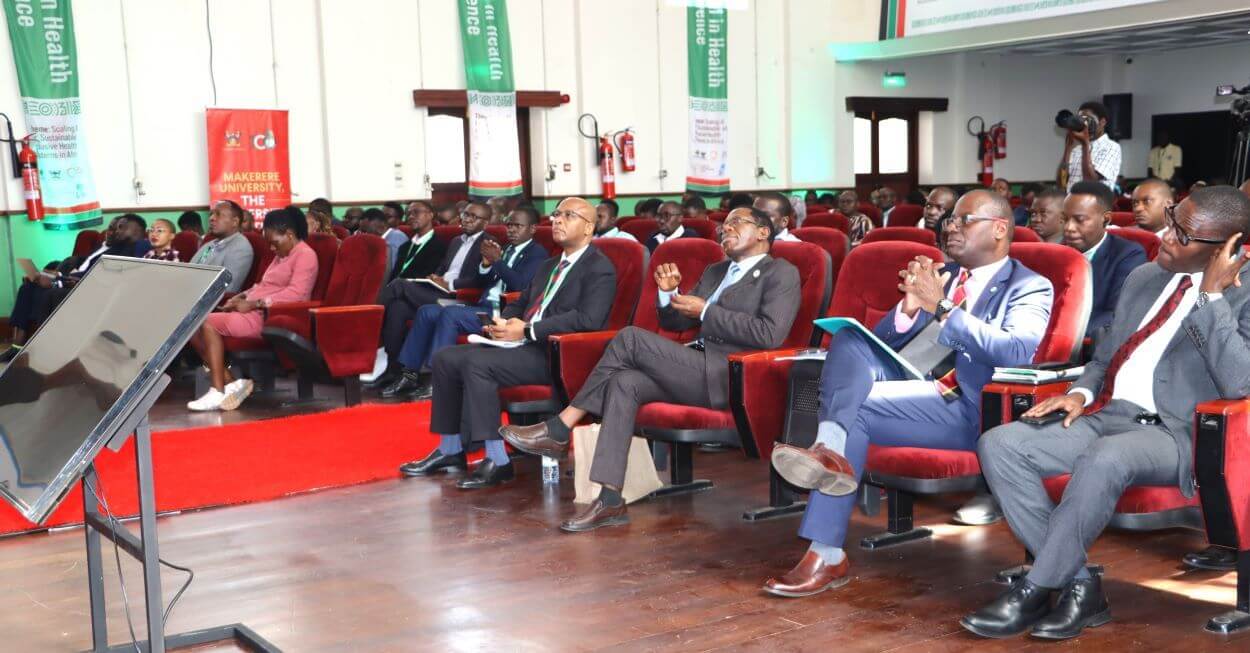
A section of participants in the Main Hall
“Through these connections, discussions, and shared innovations, we have the opportunity to leapfrog traditional challenges and ensure that AI truly improves healthcare for all,” Dr. Nakasi concluded.
By jane Anyango
Principal Communication Officer CoCIS

